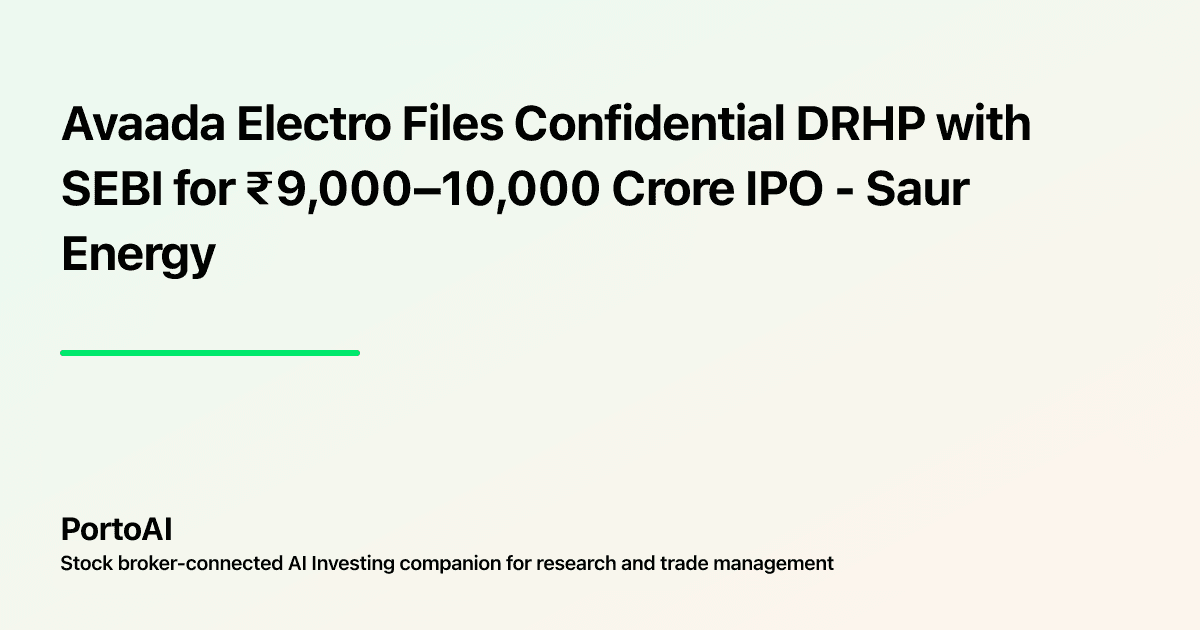What is Dabba Trading? Risks & Why Regulated Investing Wins

Venkateshwar Jambula
Lead Market Researcher
4 min read
•Published on September 23, 2024
•Understanding Dabba Trading: The Risks of Unregulated Markets
While the allure of higher returns draws many to the stock market, a shadow practice known as dabba trading operates outside the purview of official exchanges. This method, while seemingly offering alternative avenues, presents significant risks that undermine the integrity of financial markets and the security of investor capital. At PortoAI, we advocate for disciplined, data-driven investment strategies within regulated frameworks, which stand in stark contrast to the speculative nature of dabba trading.
What is Dabba Trading?
Often referred to as box trading or bucket trading, dabba trading is an illegal and unregulated form of stock market speculation. The term 'dabba,' meaning 'box' in Hindi, aptly describes its clandestine and unofficial nature. In this practice, participants essentially place bets on the future price movements of securities rather than engaging in the actual buying and selling of those securities on recognized stock exchanges. Settlements are handled internally by the 'dabba operator,' circumventing regulatory oversight and investor protections.
This practice deviates from legitimate investing, functioning more akin to gambling on price fluctuations. Crucially, trades executed through dabba channels are not recorded on official exchanges like the SEBI-recognized platforms. This means investors lose access to vital grievance redressal mechanisms and the transparency inherent in regulated markets.
How Does Dabba Trading Operate?
Dabba trading typically functions through informal networks of brokers who act as intermediaries. They connect traders looking to speculate on price movements within this unofficial market. Two primary methods are observed:
- Internalized Trades: A dabba broker might match buyers and sellers of a particular stock internally. For instance, if a trader wants to buy 50 shares of XYZ Ltd at ₹200, the broker finds another client willing to sell those shares at the same price. The broker facilitates this transaction and earns a commission based on the trade value, all without the trade ever hitting an official exchange.
- Price Movement Betting: A more direct form of speculation involves traders betting on whether a stock's price will increase or decrease by a certain amount within a specified period. If Trader B bets that ABC Ltd will rise from ₹300 to ₹350 within a week, and it does, Trader B profits. Conversely, if the price falls, Trader B loses their stake to the broker.
These methods bypass the fundamental principles of investing, focusing purely on short-term price speculation and internal settlement.
Key Characteristics of Dabba Trading
The defining features of dabba trading highlight its inherent risks and illegality:
- Absence of Regulatory Oversight: Dabba trading operates entirely outside the legal framework of stock exchanges, meaning no rules, regulations, or investor protections apply.
- Tax Evasion: A significant appeal for participants is the avoidance of taxes such as the Securities Transaction Tax (STT) and Commodities Transaction Tax (CTT), which are mandatory on official exchanges.
- Reduced Transaction Costs: By operating off-exchange, dabba trading bypasses standard fees like trading costs, stamp duty, and depository charges.
- Unreported Financial Activities: Transactions are often conducted in cash and kept off the books, facilitating the generation of unreported income and potentially funding illicit activities.
- Perceived Faster Execution: With minimal participants and no regulatory hurdles, trades can appear to be executed quickly.
- Potential for Price Manipulation: The unregulated nature creates an environment where prices can be more easily manipulated to benefit operators.
The Significant Risks of Dabba Trading
The proliferation of online dabba trading apps has unfortunately drawn unsuspecting investors into these illicit schemes. The risks associated with participating in dabba trading are substantial:
- Complete Loss of Capital: Investors are highly susceptible to fraud and price manipulation. Without regulatory safeguards, there is no recourse if the operator absconds with funds or manipulates prices to their detriment.
- No Legal Recourse: In the event of a dispute or fraud, participants have no legal standing or mechanism for resolution since the trades are not recognized by any official body.
- Severe Legal Consequences: Engaging in dabba trading is a criminal offense. Under various securities laws and penal codes (such as India's Securities Contracts (Regulation) Act and Indian Penal Code), conviction can lead to lengthy prison sentences, substantial fines, or both.
Why Regulated Investing is the Superior Path
At PortoAI, we champion a disciplined approach to investing, grounded in data and executed within the secure environment of regulated financial markets. While dabba trading offers a semblance of quick gains through speculation, it fundamentally lacks the safeguards, transparency, and long-term potential of legitimate investing.
Legitimate investment platforms provide:
- Regulatory Protection: Ensuring fair trading practices and providing avenues for dispute resolution.
- Transparency: All trades are recorded and auditable, offering clarity on market activity.
- Security: Investor capital is protected by established financial regulations.
- Access to Data and Analytics: Tools like the PortoAI Market Lens provide sophisticated data synthesis and market signals, enabling informed decisions rather than speculative bets.
- Risk Management Tools: Features within the PortoAI platform help investors understand and manage their risk exposure, a concept entirely absent in dabba trading.
Conclusion
Dabba trading represents a dangerous departure from sound financial practice, preying on the desire for quick profits while exposing participants to fraud, loss, and legal repercussions. For investors seeking to build wealth responsibly and sustainably, adhering to regulated markets and leveraging advanced analytical tools is paramount. PortoAI empowers sophisticated investors to navigate markets with confidence, armed with data-driven insights and robust risk management capabilities, ensuring a path toward achieving long-term financial objectives.
Blog
Investment Insights and Tips
Explore our latest investment strategies and insights.

Stocks
Suzlon Energy Q2 FY26 Results: PAT soars 538% YoY to Rs 1,279 crore, highest in 30 years; revenue jumps 85%
Suzlon Energy, an Indian renewable energy solutions provider, reported a record-breaking performance for Q2 FY26, with consolidated Profit After Tax (PAT) surging 538% year-on-year to Rs 1,279 crore, marking its...
Venkateshwar Jambula
November 5, 2025
•4min

Stocks
Groww IPO set to open: Does valuation and GMP leave room for any listing gains?
Groww’s Rs 6,632 crore IPO, one of India's biggest fintech listings, is met with cautious optimism. While strong fundamentals and profitability are noted, a steep valuation and regulatory uncertainty could...
Venkateshwar Jambula
November 4, 2025
•5min

Stocks
Softbank-backed Meesho, Zomato-backed Shiprocket among 7 companies to get Sebi's approval for IPO launch
India's capital markets regulator, Sebi, has granted approval for the launch of Initial Public Offerings (IPOs) to seven companies, including prominent e-commerce players Meesho (Softbank-backed) and Shiprocket (Temasek-backed). These approvals...
Venkateshwar Jambula
November 4, 2025
•5min

Stocks
Avaada Electro Files Confidential DRHP with SEBI for ₹9,000–10,000 Crore IPO - Saur Energy
Note: Broker connections are subject to availability and your broker’s terms.
Venkateshwar Jambula
November 2, 2025
•6min